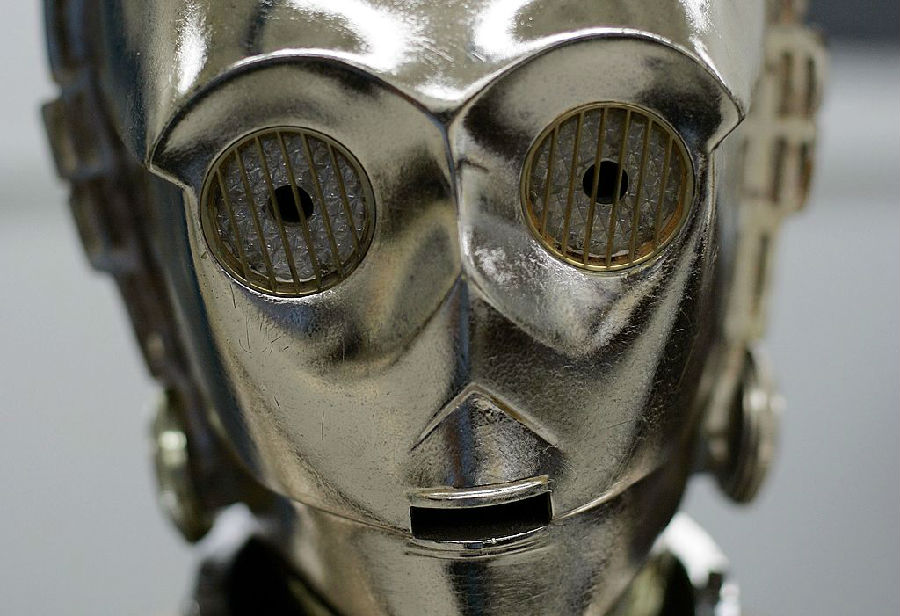(单词翻译:单击)
This month, the European Parliament voted in favour of a resolution to create a new ethical-legal framework for robots. The Commission does not have to follow the parliament’s recommendations, but if it refuses it will have to explain why.
欧洲议会(European Parliament)本月通过一项决议,其内容是建立针对机器人的新的伦理-法律框架。欧盟委员会不必遵循前者的建议,但如果拒绝,它必须解释原因。
The basic idea is reasonable. Today, we spend increasing amounts of time in the infosphere. In this digital ocean, robots are the real natives: we scuba dive, they are like fish. Robots of all kinds will multiply and proliferate, making the infosphere even more their own element. Add artificial intelligence, smartphones, cloud computing, big data, machine learning and the internet of things, and it becomes obvious that there is no time to waste.
基本理念是合理的。当今,我们在信息空间花费的时间日益增多。在这个数字海洋里,机器人才是真正的本地人:我们戴着水肺潜水,而它们就像鱼一样。各种各样的机器人将会迅速增加和繁殖,使信息空间在更大程度上成为它们如鱼得水的环境。再加上人工智能、智能手机、云计算、大数据、机器学习和物联网,显然没有时间可以浪费了。

We are laying down foundations for the mature information societies of the near future, so we need new ethical frameworks to determine which forms of artificial agency we are happy to see flourishing in them. Against this background, the EU’s initiative provokes mixed feelings: excitement at the aspiration but disappointment at the implementation. There is too much fantasy and too little realism.
我们正在为不久的将来的成熟信息社会奠定基础,因此我们需要新的伦理框架来确定:我们乐于看到什么形式的人工能动性在那样的社会绽放?在这样的背景下,欧盟的倡议让人喜忧参半:既有对抱负的激动,也有对实施的失望。幻想太多,现实太少。
Consider two key issues: jobs and responsibilities. Robots replace human workers. Retraining unemployed people was never easy, but it is more challenging now that technological disruption is spreading so rapidly, widely and unpredictably. There will be many new forms of employment in other corners of the infosphere — think of how many people have opened virtual shops on eBay. But new and different skills will be needed. More education and a universal basic income may mitigate the impact of robotics on the labour market.
想想两个关键问题:工作岗位和责任。机器人取代人类劳动者。重新培训失业人员从来都不是一件容易的事情,而随着科技造成的扰乱如此迅速蔓延、影响广泛和不可预测,这变得更具挑战性。在信息空间的其他角落将出现许多新的就业形式——想想有多少人在eBay上开了虚拟商店。但人们将需要新的、不同的技能。增加教育机会和实行全民基本收入或许可以缓解机器人对劳动市场的影响。
Society will need more resources. Unfortunately, robots do not pay taxes. And more profitable companies are unlikely to pay enough extra taxes to compensate for the loss of revenues. So robots cause a higher demand for taxpayers’ money and a lower supply of it.
社会将需要更多资源。遗憾的是,机器人不交税。而比较盈利的企业不太可能缴纳足够多的额外税款来补偿财政收入的损失。也就是说,机器人带来对纳税人资金的更高需求,却也带来更少的税收收入。
How can one get out of this tailspin? The report correctly identifies the problem. But its original recommendation of a robo tax on companies that employ robots — a proposal that did not survive into the final text approved the parliament — may not be feasible, for what counts as a robot? It may also work as a disincentive to innovation.
如何摆脱这种困境?该报告正确地界定了这个难题。但其原本提出的方案(对使用机器人的企业征收“机器人税”;该提案未能进入议会通过的最终文本)或许并不可行,因为什么才算机器人呢?这还可能阻碍创新。
And where should we allocate legal responsibilities? If my robot breaks my neighbour’s window, who is responsible? The company who produced it, the shop who sold it, I the owner, or the robot itself — if it has become completely autonomous through a learning process, capable of intelligent action? The report suggests a “specific legal status” for more advanced robots, as “electronic persons responsible for making good any damage they may cause”, which has been approved in the final document. So companies may not pay a robo tax and may not even be liable for some kinds of robots. This is a mistake.
此外,我们如何分配法律责任?如果我的机器人打破了我邻居的窗户,谁该为此负责?生产这台机器人的公司、销售这台机器人的商店、我这个所有者、还是机器人自己——如果它通过学习过程,变得完全自主,能够做出智能行动?报告建议,对比较先进的机器人赋予一种“特殊的法律地位”,将它们视为“有责任赔偿它们可能引起的任何损失的电子人”,这一点在最终的文件得到认可。这样一来,企业或许无需缴纳机器人税,甚至可能无需对某些机器人承担赔偿责任。这是一个错误。
There is no need to adopt science fiction solutions to solve practical problems of legal liability. Jurisprudence already provides a solution.
没必要用科幻小说里的解决方案来解决法律责任归属的实际问题。法理学已经提供了一个解决方案。
If robots become as good as human agents — think of the droids in Star Wars — we can adapt rules as old as Roman law, in which the owner of enslaved persons is responsible for any damage. As the Romans knew, attributing some kind of legal personality to robots (or slaves) would relieve those who should control them of their responsibilities. And how would rights be attributed? Do robots have the right to own data? Should they be “liberated”?
如果机器人变得像人类行为人一样优秀——想想《星球大战》(Star Wars)里的机器人——那么我们可以借鉴罗马法这样的古老规则。罗马法规定奴隶的主人要对奴隶造成的任何损坏负责。正如罗马人看到的,将某种法律人格赋予机器人(或者奴隶)会让那些应该控制它们(他们)的人逃脱责任。而且,权利又该如何归属?机器人有权利拥有数据吗?它们应该被“解放”吗?
It may be fun to speculate about such questions, but it is also distracting and irresponsible, given the pressing issues at hand. We are stuck in the wrong conceptual framework. The debate is not about robots but about us, and the kind of infosphere we want to create. We need less science fiction and more philosophy.
围绕这些问题进行猜测也许很有趣,但考虑到当前面临的迫切问题,这也是让人分心和不负责任的。我们陷入了错误的概念框架。这场辩论与机器人无关,而与我们有关,与我们想要创建什么样的信息空间有关。我们需要少一些科幻小说,多一些哲学。


